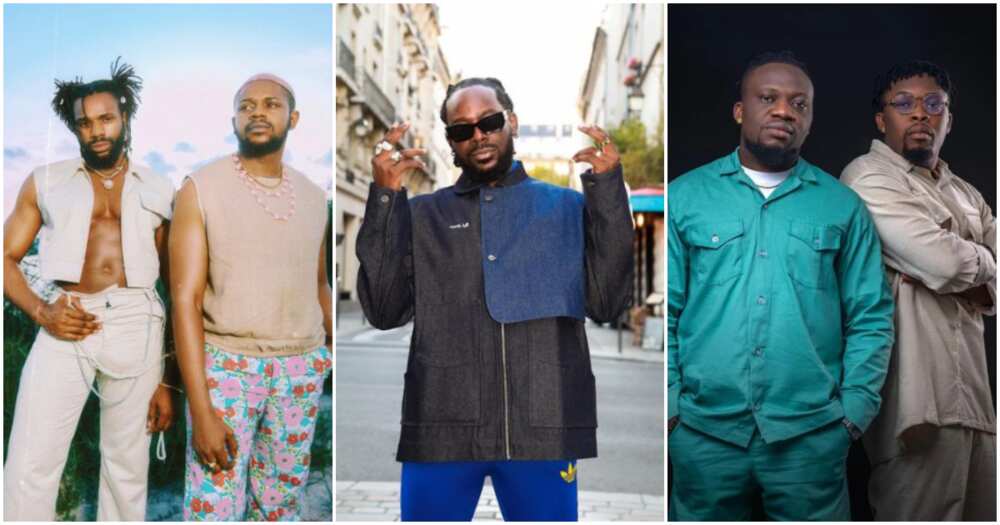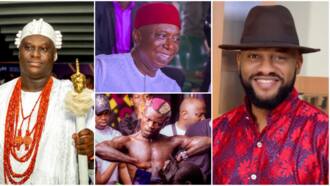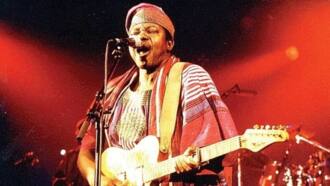Highlife Music: Meet Cavemen, Fireboy DML, Umu Obiligbo the New Wave of Afrobeats, Set for Global Domination
- Over the last few years, many people have come to associate highlife music as a genre synonymous with the South-Eastern part of Nigeria
- This belief, when it held sway, it led to the decline of highlife in the mainstream of Nigeria's music industry until a recent resurgence and a fusion of its form into Afrobeats
- In this article, Legit.ng would take a critical look at the origin of highlife music in Nigeria; It's come back and the young new artists leading its resurgence
PAY ATTENTION: Сheck out news that is picked exactly for YOU ➡️ find the “Recommended for you” block on the home page and enjoy!
Highlife is a popular genre of music that started along the Gold Coast (modern-day Ghana) in the 1880s.
It is dance music that comprises a fusion of African rhythm and Jazz, which is a European kind of music. The reason for this fusion is basically because highlife is played using Western instruments such as the guitar, Jazz horns and in some cases a banjo.

Read also
New Afrobeat stars on global stage: Meet 8 Nigerian singers that got big breaks as International Artists 2022

Source: Instagram
Just before 1939, highlife was regarded as Native Blues in Nigeria and was harnessed by coastal dwellers in towns like Warri, and Lagos amongst others. By the start of 1950, highlife was fast becoming an Igbo genre for the Igbo people of Eastern Nigeria.
Highlife becoming an Igbo music genre
By the sixties, there was already "Igbo Highlife" and was a sought-after genre of music, not only amongst the Igbo but also amongst the other tribes that comprised Nigeria.
PAY ATTENTION: Сheck out news that is picked exactly for YOU ➡️ find the “Recommended for you” block on the home page and enjoy!
Igbo highlife was sung in Igbo, and played with Western instruments. It had a similar rhythm to the Akan from the late nineteenth century.
Over the years, there have been leading artists who have played vital roles in ensuring that highlife is well projected on the international scene.
George Darko is regarded by many scholars as the first face and voice of highlife music. Darko's music was inspiring, and the whiz left a strong legacy of contemporary music on the African continent.
The Fathers Of Highlife music in Nigeria
In Nigeria, Orlando Owoh is acknowledged as the father of highlife in the country. Born in Osogbo in 1932, he died at 76 having imparted so much to African society.
Owoh was very popular in the 1970s with his Omimah band. He performed at numerous shows around Africa and Europe.
However, the man who is regarded as the King of Highlife is Emmanuel Tetty Mensah. The Ghanaian legend was born just after the First World War ended. Mensah lived till he was 77, having passed a lifelong legacy to millions around the world.
Highlife is no longer a top genre of music in Nigeria or Ghana but is still very relatable in the modern day as many highlife artists continue to host shows and release tracks in an effort to reinstate what was once the chief genre of West African music a century ago.
The re-emergence of highlife and its fusion with Afrobeat
With the rapid rise of Afrobeats in West Africa and around the globe, highlife has slowly begun to decline.
However, quite a number of contemporary musicians are doing a good job of retaining the identity of highlife as a genre of music, albeit fusing it with Afrobeats.
An example of such an artiste is Adekunle Gold, Often known as AG Baby, he shot to stardom when he released 'Sade', a cover song for 'Story of My life' by American band One Direction. He soon afterwards dropped Orente which went on to be a huge hit around Nigeria and even in Africa.
In the last two years, Adekunle Gold has revised his music and is now considered more an Afrobeats artist than a traditional highlife musician.
The Cavemen, the new face of Afro-highlife music
A more conservative highlife band are The Cavemen. This duo comprises the brothers Kingsley Okorie and Benjamin James, who is the drummer in the group. The young lads were discovered by contemporary singer and songwriter Lady Donli.
The brothers were born in Lagos, but hail from Eastern Nigeria. Their first album, Roots, was released in 2020, and it was a huge success hit amongst the youth and also for the elderly to also see their youth in retrospect.
Passing powerful messages through their songs, The Cavemen have a view of bringing the old style of highlife to their newly invented innovative form of highlife, and it has proven to capture a wider audience.
Umu Obiligbo, retaining the core of Igbo highlife
Neo-highlife will be incomplete without mentioning Umu Obiligbo. This duo began their highlife journey in 2014 and are brothers just like The Cavemen named Chukwuebuka and Ifeanyichukwu.
They sing highlife, unlike Phyno who tends to do highlife with modern-styled rap and in some cases, Afrobeats.
Umu Obiligbo sings Highlife in its original Igbo form, dating back to the 1960s. Their audience is often from the Eastern part of the country due to the language peculiarities, but they have been able to gain reasonable ground in other parts of Nigeria.
They dwell majorly on daily contemporary issues, especially about lifestyle and social activities, as well as vices in society.
Their song "Doubting Thomas" which featured Davido received national recognition as they featured a mega Afrobeats star.
From Kwam1 to Burna Boy, Olamide: The evolution and influence of Fuji on contemporary Afrobeats sounds
Music is life; its essence and cultural impact on history is undeniable. The growth of the Nigerian music industry over the last three decades has been a phenomenon and a thing of tremendous pride.
Over the last century that the organised Nigerian music industry came into existence, its indigenous sounds and tunes have always been appealing to the international markets and beyond.
The current global acclaim that the famous Nigerian sound, Afrobeat, is currently witnessing didn't start with Wizkid, Burna Boy and Davido. Rather, it's been a work in the pipes for years that finally got its notable international big break.
Source: Legit.ng




